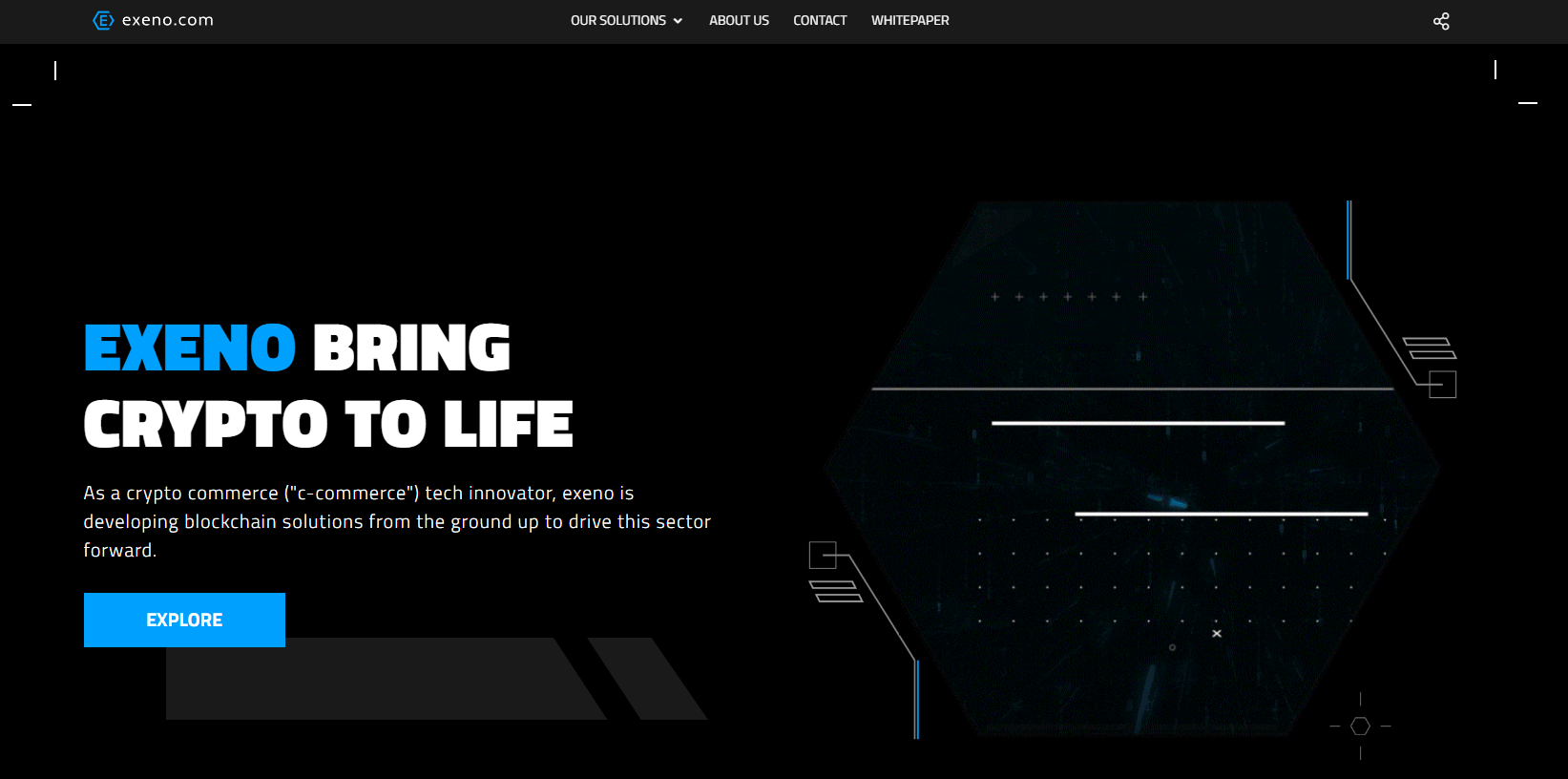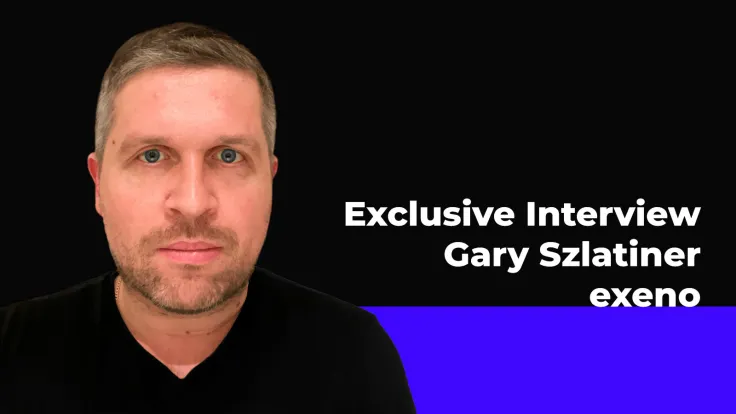Recently, I spoke with Gary Szlatiner, the chief growth officer at exeno. We discussed the company’s main goals and visions, which include creating the world's first peer-to-peer marketplace for cryptocurrency purchases only, built from the ground up and using the latest web 3.0 approaches. It was a nice conversation, and Szlatiner shared the top positions in his investment crypto portfolio. Don’t miss this piece!
U.Today: How did you get started in the field of crypto and related technologies?
Gary Szlatiner: I've been associated with the industry for a while now. I started getting interested in cryptocurrency and its related technologies around the 2011-2012 period. At that time, I was working in the online gambling industry (for about 9 years total). I started with some mining, some buying, and I even sold crypto on eBay. There was a period on eBay where you were actually able to sell crypto, but they updated their policies rather quickly.
It wasn't until, I'd say around 2016-2017, when I started getting more serious about & focused on this industry. In that period, I ran two ICOs. In 2017, I led a joint venture between some Chinese business contacts and a conglomerate in Indonesia setting up an incubator in Jakarta that would look into developing technologies and products, specifically on blockchain and in crypto. Back then, I launched what was basically a more advanced CryptoKitties clone on the Ethereum blockchain. Oh, what a “nightmare” that was, because it was really nothing like what we have today in terms of development environments and blockchains, and so forth.

It was also a good lesson that next time I needed to get investment from people who understand the technology, as - after about two years of developing and deploying solutions - due to a regional economic downturn and the looming crypto winter at that time, the investors pulled out to focus on their non-digital businesses. A pity really as we launched solutions ahead of their time, we even had what I would argue was the world's first seamless fiat-to-NFT payment solution. I have moved on since and I have worked with DeFi products, mining projects, cryptocurrency projects, metaverse, crypto e-commerce, and more. Basically, I've been very fortunate in these last few years to be able to actually say that I've been hands-on within different sectors of this industry, having this spectrum of experience that I don't think many can get. It gives me a nice feel for this industry as well. A current focus of mine where I can apply this experience is exeno.
U.Today: That's a lot of projects. Let's focus on exeno this time. What does its ecosystem include?
Gary Szlatiner: Exeno is a very interesting company in the sense that it tackles a category in this industry that many don't. You've got your DeFi, your Metaverses, your NFT projects and so forth, but no one's really thinking about tackling the true, root nature of why crypto came in the first place, or at least one of the main roots. When you read the Bitcoin whitepaper, it has words like “commerce,” “transactions,” etc. It doesn't have words like “commodity,” or “stock market.” What exeno is saying is, “Look, crypto was brought to life because of commerce, transactions, etc.,” but right now, the end to end e-commerce experience is not necessarily tailored to crypto users.
Of course, you can go to any of the popular e-commerce platforms, pay with your crypto card and you are technically buying with crypto, but that's not a focus on actually using Web 3.0 technologies to improve it. What we're doing right now is we've got a merchant site that's live — it’s our proof of concept.
We're using it to get insight into the behavior of crypto shoppers, of their needs and other points. We've also launched our exeno coin, and this high-utility coin will have a wide variety of different functions, including discounts on our website and paying our affiliates, among others.
Since exeno coin is a multi-chain coin, we're launching our own bridge, our own cross-chain swap and a wide variety of ecosystems even around the coin itself. But going back to the commerce side, all the insights, all the stuff we're working on right now is for the ultimate goal of launching what will become the world's first peer-to-peer marketplace for cryptocurrency purchases only, built from the ground up and using the latest web 3.0 approaches. Now that sounds like “so what,” right? Alibaba, eBay, all these companies have been around for decades now. Well, it is a big deal. The reason is that you're dealing with cryptocurrency that still has — although diminishing — a level of anonymity. That’s number one. Number two, you're trying to bring that level of verification but still “keep it crypto”. Number three, we're not just going to allow stablecoins. We're going to allow popular cryptocurrencies where the price is fluctuating. So, when you take all these elements to create a marketplace environment that's safe, secure, but also functional enough for a transaction between two people to occur, it is quite a complex topic.

For example, you sell me your laptop for, let's say, one Ethereum at a certain price. I want to make sure that I get that laptop before you get that one Ethereum, right? So that Ethereum is being held in an intermediary. Now, I get the laptop, and Ethereum in this example nosedives by 30%. What happens then? I mean, you didn't sell me the laptop for 30% less the Ethereum price at time of sale, you sold it for one Ethereum at the price at the time of sale. And this is where one of our other products, Screx, which is going to be our payment backbone & gateway as well as resolution center & KYC product, comes into play.
Additionally, we will be using SSI-based technology, where people are able to KYC themselves and still retain ownership on the blockchain of their documents. Also, this will be used to verify sellers and people who leave reviews as well as tackling review fraud, which is still a big problem in traditional e-commerce. There will be a resolution center and a price stabilizing mechanism where the aim is that the exeno coin will play a highly important role of price stabilization to ensure that by the time you get that money, as in my laptop example, you actually get the full value. We won't necessarily base it off of crypto amounts.
We may base it off of the USD or a stable coin amount, because ultimately if you want to sell a laptop for $2,000, you want $2,000 to come into your account. We want to offer the environment that people in crypto will feel comfortable with, which doesn't “sell out” too much to Web 2.0, but at the same time, implements key elements from Web 2.0 while maintaining its Web 3.0 pedigree and actually offering something unique up until a point everything can move to Web 3.0.
Therefore, it is actually quite challenging to develop a peer-to-peer marketplace with crypto. There is no Visa or MasterCard to call and perform a chargeback. Currently, if you send me a brick instead of sending me a laptop, there's nothing I can do, or at least not much. We have to actually build all the support from the ground up. That's where the exeno ecosystem comes into play.
U.Today: Does your current marketplace work with BTC only, or can you accept other cryptocurrencies there?
Gary Szlatiner: Today, what's live is any currency that is Binance Pay supported. We also offer WalletConnect enabled as well as MetaMask options. You can purchase with many of the popular cryptocurrencies today, but when we get to the peer-to-peer marketplace, we're going to allow that as well. Interestingly enough, another feature of Screx — the payment gateway backbone — is that we are not going to force people to buy by opening up a Screx account. Screx will be a multi crypto wallet & payment gateway compatible. In the future marketplace, you'll be able to make purchases in MetaMask and still enjoy those security, resolution and full set of features offered by Screx.

This is another key element that I see becoming a trend starting in our blockchain industry. Namely, we know we have barriers to entry, barriers to mass adoption. We say: “Oh, it's the regulations, it's the taxes, etc.” Actually, we have to sometimes look at ourselves first and take the best practices from other industries to tackle items right in front of us that also serve as barriers to mass adoption. One massive barrier to industry entry, to using this technology, is that most companies tend to force their approach on users, touching on UX/UI here.
What we're starting to finally see, however, with many different projects — including exeno and Screx — is we're considering the fact that people are not necessarily fully ready to change their day-to-day habits. They want to get involved, but they don't want to say, “What I've been doing for x years now, I'm going to throw it out and now I'll just go with you.”
What we're doing is showing people that if you for example, use MetaMask, if you use WalletConnect, and continue to use it, you'll still get the benefits. This “bridging in'' is finally starting to make some headway in our industry. I'm seeing other companies also understanding that people need time to get used to something new.
U.Today: What can you tell us about the exeno coin?
Gary Szlatiner: Exeno coin is an EIP-1363 standard coin, an advanced standard on the ERC protocol. It will have a lot of utility. We're going to offer exclusive discounts only for exeno coin holders on our current site and in the future as well. We've reinvented the cashback concept. When you go to a traditional e-commerce site, you purchase something, and you get a percentage of cashback. But that's pending for 14 or 30 days before you actually get that back. We're launching our own version, and calling it Stake Back, because what we're doing is that when someone purchases a qualifying item, they'll get a percentage back in exeno coin, but it gets automatically staked for those 30 days (the traditional pending period).
That approach does two things. Number one, it gives a little bit more of a reward, but number two, we're hoping it teaches people what staking is. They will see that as another benefit of crypto. We'll be also paying out our affiliate commissions in exeno coin. We'll be paying out any sort of commissions with our partners in exeno coins. It will have that integral role within the ecosystem in terms of payments and transactions.
We also decided that if we're going to become the crypto commerce driver, our coin can't be tied to one chain. It should be blockchain-agnostic. The result is that exeno coin is currently on BNB Chain, Ethereum, as well as Polygon. We'll be adding more chains. We just feel it needs to be independent. Let people own the version of the coin that they want to own.
U.Today: Exeno is also developing its own NFT capabilities. Can you tell us about that?
Gary Szlatiner: Absolutely. I can assure you, it's not just another NFT marketplace. The world doesn't need another NFT marketplace. When you take a step back, you see that there's this misunderstanding continuously thriving in our industry. Most people still look at NFT sales and they think only about the art side. They basically see that it's plummeting. And many people will just say, “Well, you know what? NFTs are over. It was a nice ride, bye NFTs.” But we forget that the technology has many different applications: ticket sales, ownership rights, the list goes on. When we talk about NFTs here at exeno, we're first talking about allowing people to sell digital goods to each other in the form of NFTs.

Creatives can create whatever you see on the current marketplace that will be there for sure, but that's not the major application here. We're going to be looking into NFT technology and how it can play a very meaningful role in the crypto e-commerce space first. Think about purchasing a new phone, and you want a background, so you can buy it as an NFT. That's the physical-meets-digital sort of combination. But getting on to the more complex, the more interesting use case scenarios — think about a receipt as an NFT, proof of purchase for insurance purposes as an NFT, your ID when we do SSI verification using NFT technology as your badge. This is the area that we're focusing on more with NFT tech.
U.Today: What are your company’s plans for the upcoming year?
Gary Szlatiner: The main plans are definitely to deploy Screx, our payment & resolution backend solution, by Q2 of next year, and the exeno 2.0 peer-to-peer marketplace also by Q2 2023. When they deploy, these two main products - along with their subfeatures - will definitely be dominating the next year because of how much we have planned in terms of developing them out also in the B2B area.
Those two products alone will keep us extremely busy, but we will continue with others. For exeno coin, further defining its functionality and offering it more utility will be another key element. We are going to be listing the coin soon, in October. The strategy is to continue to get on quality and large exchanges across next year as well. We're in this business for organic development, not for overnight development. Each product from exeno coin to Screx to exeno 2.0 has its own individual vision, that then ties in with the overall vision.
Of course, we'd like to spin off. I would say we are looking for third party usage as well for our products. I cannot fully confirm yet, but my assumption is that Screx will be our first product that other companies will be utilizing so we have to make sure that it is usable by third parties.
U.Today: Do you have a crypto portfolio? If so, what are your top three positions?
Gary Szlatiner: Yes, I do have a crypto portfolio. First things first, I don't believe in or support shorting in our industry. I'm definitely long on Polkadot. I truly believe that Polkadot fits in line with my ethos of a real product, a real challenge being solved, a real industry progression being made, and a real commitment by people to make that happen.
What you're going to find with me is that I'm probably not going to name some of the usual popular ones. I’m obviously always long on Binance’s coin, BNB. Binance just does things right within its ecosystem building.
I'm also holding Ethereum right now. Of course, I want to see where — finally! — the recent Merge takes us. It's been years in the making. To see where Ethereum is going now, it just makes sense to hold it.
When it comes to the other types of projects, I'm following numerous ones, but one that sticks out to me is Hedera. It's still a very curious project for me, in a positive way, because of how many companies are behind it and their unique approach to a unique protocol. It was making some waves before this crypto winter, but much like many of the projects, I assume because of crypto winter, they've been focusing on getting out of it. It'll be interesting to see what happens with Hedera.
U.Today: Let's speculate on the Bitcoin price a little bit. I only need your guess. I ask everyone this question: what will the Bitcoin price be at the end of this year?
Gary Szlatiner: I'm going to give you two answers here. My first answer is the one that you want to hear. And my second answer is the one that I genuinely feel. I think, honestly, we'll end this year with Bitcoin being around the 28K mark. I don't foresee anything happening to make it go back to 69K this year.
That is tied in with my second answer: I actually don't bother with Bitcoin in terms of investment nor do I apply as much emphasis in following it as many still do. What I'm really happy about is seeing altcoins are starting to stand on their “own two feet” finally. That’s good for our industry. I want to see them continue gaining their own “independence” from the Bitcoin trend. Also, Bitcoin is PoW — proof of work. We see that Ethereum is basically saying, “I want to be away from that for many beneficial reasons.” Bitcoin is still relatively clunky, it's slow. Its unique use cases are diminishing. Having said all of that, however, I have so much respect for Bitcoin and its creators and supporters, just to be very clear. If it weren't for them, we wouldn't even be having this chat today. But personally speaking, I find it still kind of like an unhealthy addiction, especially this fascination with pricing it, when the question should be who will be the new “stars” in the new era after this crypto winter, and what will their price be.
U.Today: Thank you so much, Gary. That was incredibly interesting.




 Dan Burgin
Dan Burgin Vladislav Sopov
Vladislav Sopov